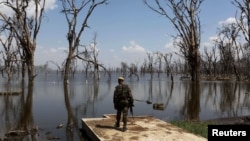Ten African countries have committed to restore 31 million hectares of degraded and deforested land, under a new push to make 100 million hectares productive again by 2030.
The AFR100 scheme, launched on Sunday in Paris, will be backed by $1 billion from the World Bank and additional funds from Germany, as well as $545 million in private-sector investment.
"Restoring our landscapes brings prosperity, security and opportunity," said Rwanda's Minister of Natural Resources Vincent Biruta.
"With forest landscape restoration, we've seen agricultural yields rise and farmers in our rural communities diversify their livelihoods and improve their well-being," he added in a statement.
The countries taking part so far are Democratic Republic of Congo, Ethiopia, Kenya, Liberia, Madagascar, Malawi, Niger, Rwanda, Togo and Uganda.
"If the Congo Basin is not well managed, the land will become degraded and turn into grassland, and then the desert will take over the whole of Africa," Henry Djombo, Republic of Congo's forest economy minister, told the launch of the initiative in Paris.
The new land restoration program builds on national commitments made by African countries for a U.N. deal to tackle climate change, due to be agreed in the French capital next week.
So far, 13 of the climate action plans submitted by African governments include restoration, conservation of standing forests or agriculture that adapts to climate shifts and limits greenhouse gas emissions.
Implementing those pledges starting in 2020 would reduce Africa's annual emissions by 36 percent, or 0.25 percent of global emissions, according to the World Resources Institute (WRI).
"These countries are well on their way to meeting the goal of restoring 100 million hectares of land, which will help sequester carbon and bring economic benefits to low-income, rural communities," said WRI president Andrew Steer.
As well as storing carbon, forests and trees can improve soil fertility and food security, increase water supplies, reduce desertification, boost biodiversity and help create green jobs, according to a statement on the AFR100.
With Africa's population expected to nearly double by 2050, demands are increasing on already scarce soil and water resources, as climate change bites.
Land restoration efforts include planting trees, stopping soil erosion and improving soil health, bringing wide benefits.
Restoration is already happening. For example, in Niger, farmers have increased the number of trees across 5 million hectares of agricultural land, improving food security for 2.5 million people, the AFR100 noted.
The scheme aims to help countries and communities share knowledge and resources to achieve restoration on a bigger scale, it said.
Great green wall
Ibrahim Assane Mayaki, CEO of the New Partnership for Africa's Development - one of 10 organizations providing technical support to AFR100 - said land restoration had worked well in African countries from Malawi to Ethiopia and Mali.
But efforts should be expanded, as over 700 million hectares of African land could potentially be restored, he added.
Last week, world leaders and international agencies pledged $4 billion over the next five years to step up implementation of the "Great Green Wall", a land restoration program in the Sahel that was launched in 2007.
Over the next 10 years, it aims to restore more than 50 million hectares of land, in addition to the AFR100 pledges. The Green Wall efforts will also count towards the 100 million-hectare goal, endorsed by the African Union.
The Green Wall plan will help sequester an estimated 250 million tonnes of carbon and provide new income opportunities for millions of young people who might otherwise consider migrating from poverty-stricken areas, a statement said.
On Saturday, governments and financial institutions announced new pledges for a separate $730 million initiative in Latin America and the Caribbean to restore deforested land by 2020. That initiative was launched a year ago.
The new commitments of just over 9 million hectares bring the total area to be restored in the region to 27.7 million hectares, an area roughly the size of Britain.





